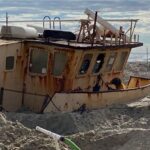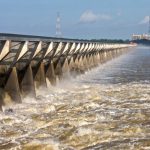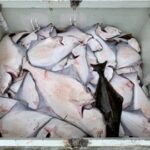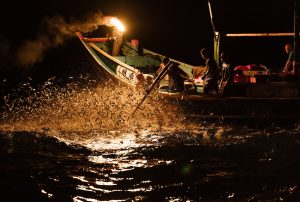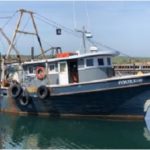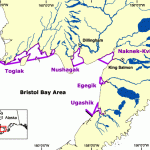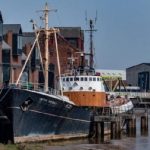The plan would launch the defense fund to help the lobster industry navigate the new rules, laws and regulations that are designed to protect a declining species of whale. Some members of the committee and the lobster industry balked at the idea, in part because it would redirect fees and surcharges the state currently uses to manage the lobster fishing industry. But Republican Rep. William Faulkingham, a commercial lobsterman himself and the sponsor of the bill to create the legal fund, said the industry will need money to win court challenges against new fishing restrictions. >click to read< 16:53
Tag Archives: Maine Lobstermen’s Association

Maine’s politicians seek delay on whale protection rules
In a letter to Commerce Secretary Gina Riamondo, Gov. Mills and other officials urge federal fisheries regulators to extend the May 1 deadline to comply with the new regulations, which are aimed at protecting critically endangered north Atlantic right whales by setting a seasonal closure and requiring modifications to gear. They are requesting a July 1 deadline. The state’s commercial fishing industry is working “in good faith” to comply with the new rules but are facing supply chain issues and other complications with less than six weeks to go until implementation of the new rules. >click to read< 17:40

Lobstermen’s group stresses connection to Maine tourism as new whale regulations approach
The head of the Maine Lobstermen’s Association spoke at the Maine Restaurant & Lodging Expo in Portland Wednesday about threats she said could erase Maine’s lobster industry and hurt the hospitality industry along with it. Association Executive Director Patrice McCarron said the lobster industry is a driver of local economies, with 4,800 vessel owners running independent small businesses, and collectively providing 10,000 jobs on the boats alone, many of those jobs irreplaceable in remote coastal areas. And the industry is booming,,, “With all that’s going so well for us, how could we possibly be looking at our fishing heritage being erased?” McCarron asked the audience. “The reason for that is the North Atlantic right whale.” >click to read< 07:50

The Maine lobster fishery is coming off a record year, faces challenges ahead
Maine’s lobster fishery scored a record-breaking value in 2021, with a 75% increase over 2020 and a 10% increase in landed weight. But fishermen face increasing pressures, including difficulty finding and keeping crew, rising operational costs, competition for fishing grounds from other industries, new regulations affecting fishing gear and methods and coastal development pressure that’s squeezing waterfront access and opportunities to live they work. >click to read< 09:25

“I guess they’re too weak.” Weak lobstering gear recalled as new whale regs approach
The weak link made by Plante’s Buoy Sticks was pulled off shelves by the company this week, taking away one of the handful of gear options at lobstermen’s disposal to meet new federal rules that go into effect May 1. One retailer said their shop was told the links were believed to be breaking too easily. Plante’s links are one of three models approved by NOAA,,, Virginia Olsen, Maine Lobstering Union, said she sent a notice to her members about the issue and hoped the recall would prompt NOAA to review allowing fishermen the easier option of putting knots in their ropes to make them weaker. “It truly would be a great assistance to us if those knots were acceptable,” she said. >click to read< 14:21
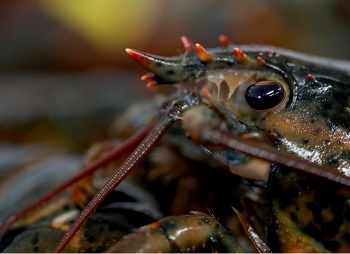
Federal windfall won’t put a stop to state lobster industry relief bills
Although Maine’s lobster industry is set to receive $17 million in federal funding as part of the 2022 omnibus spending package, it is unlikely to affect two bills going through the Legislature that seek more than $30 million in state funds for the industry. The spending bill will bring more than $200 million in funding for projects across the state. For the lobster industry, it includes $14 million to help lobstermen comply with new federal regulations intended to protect endangered North Atlantic right whales, set to take effect May 1, along with $760,000 for the Department of Marine Resources to conduct outreach and education among lobstermen, and $2.3 million for right whale research, monitoring and conservation. >click to read< 17:28
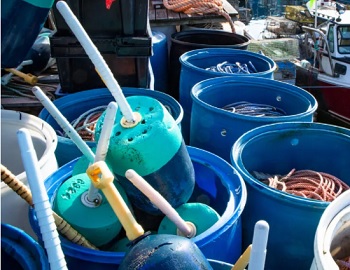
Lobstermen worry looming deadline for new regulations comes ‘too soon’ to change gear
At the beginning of the year, Maine lobstermen were having a hard time finding the new gear that is being required to help protect right whales. Though suppliers are now starting to see these new weak ropes and links come in, they haven’t received a flurry of new orders despite the looming spring implementation date. Starting on May 1, lobstermen, depending on where they fish, will have to have ropes running from their buoys to traps that can break with 1,700 pounds of force, or have inserts in the line that allow it to snap easier should a whale ever get entangled in them. >click to read< 11:15
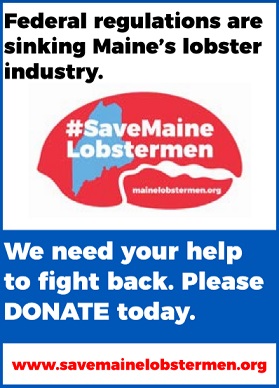
Lawmakers endorse legal fund for Maine lobstermen
A legislative committee reversed course Tuesday, voting to support a roughly $900,000 fund to pay for the lobster industry’s legal fight against federal rules that aim to protect endangered North Atlantic right whales. Two advocacy groups, the Maine Lobstermen’s Association and the Maine Lobstering Union, would split the funding. The Marine Resources committee’s majority voted against the measure last week. >click to read< 16:30

Opinion: Fighting whale-safe gear rules won’t ‘save Maine lobstermen’
The Maine Lobstermen’s Association has stepped up an advocacy campaign to “#Save Maine Lobstermen.” They and their political allies claim that new regulations to make fishing gear safer for right whales will put the lobster fishery out of business. Where is the evidence? Massachusetts and Canadian lobster fisheries are already investing in changes that the Maine Lobstermen’s Association claims are impossible. Indeed, Canada has invested $20 million to transition its trap fisheries to whale-safe gear by 2023. Digging in for a fight means that Maine lobstermen fall behind the competition. >click to read< 10:03

Maine considers fund for lobster fishermen/gillnetters hurt by whale rules
Maine is by the far the most significant lobster fishing state in the country, and members of the state’s industry have warned they will suffer because of the new rules. A proposal from Democratic Rep. Holly Stover of Boothbay would create the fund, which would provide grants for lobster fishermen as well as some fishermen who harvest other species with gillnets. “The lobster industry is an economic driver of our local economy, hands down,” Stover said. “This is not a fisheries disaster, this is an economic disaster.” >click to read< 11:18

Maine: Lobstermen could soon face another new gear regulation
Patrick Keliher, Commissioner of the state’s Department of Marine Resources, says recent research shows that the number of juvenile lobster floating in the water column or settling to the bottom is declining for a third year in a row. Now Keliher says that lobstermen should also consider another new rule to create a “trigger” mechanism for reducing the catch of juvenile lobster when their abundance falls below a certain level. Patrice McCarron, executive director of the Maine Lobstermen’s Association, on Tuesday told members of the Atlantic States Marine Fisheries Commission that fishermen will be “in shock” when they learn about the potential new rule. >click to read< 07:01

North Atlantic Right Whale: Extinction Is Looming. Everyone’s Fighting.
This May, new rules created for the lobster industry by the National Marine Fisheries Service will become official policy for boats operating in right whale territory. The agency estimates that lobster and Jonah crab traps are responsible for 95 percent of vertical end-line ropes in the areas where whale protections apply and therefore pose the most risk for entangling whales. The Fisheries Service says these changes will reduce the risk of death and serious injury by 69 percent. But in the months after the rules were finalized, the agency has seen pushback from conservation groups, who argue the new protections aren’t enough, and lobster fishing crews, who say the rules will harm their business. >click to read< 14:22
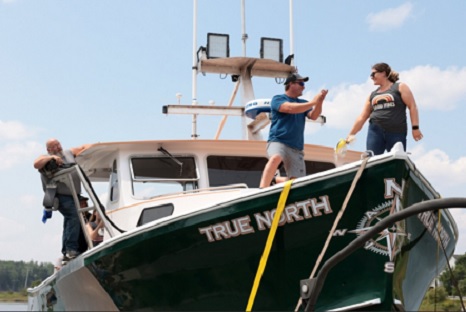
Patrice McCarron: Maine lobstermen are committed to protecting our ocean
In-depth, investigative reporting is increasingly rare these days. The resulting series, “The Lobster Trap” missed the boat, however, in its quest to invent a drama that places Maine’s lobster industry on the front line in the “battle over climate change.” From the lobster industry’s perspective, the series doesn’t accurately tell their story. Its seven key takeaways are disconnected from the people who were just a means to an end. This reporting dismisses, dehumanizes and minimizes fishermen’s role in mitigation and adaptation strategies, and it perpetuates a narrative that they are unwilling to engage in climate change conversations. >click to read< 09:21

Maine: Whale rules, pending lawsuits focus of gloomy Lobster Advisory Council meeting
A complicated and potentially grim future is predicted for the commercial lobster industry, with environmental groups, gear changes, the closure of offshore waters to lobster fishing and judicial rulings painting a “doom and gloom” picture, in the words of Department of Marine Resources Commissioner Patrick Keliher. “I think there’s going to be a lot of moving pieces,” Some of those pieces could spell the end of the commercial lobster fishery in Maine, DMR Deputy Commissioner Meredith Mendelson said, as she ran through the current lawsuits aimed at preserving the North Atlantic right whale. If any or all prevail, the lobster fishery will bear the brunt of the results. >click to read< 08:12
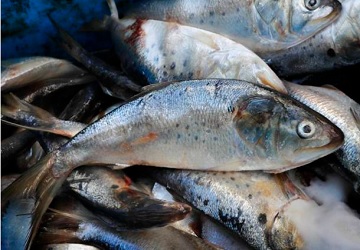
Surge in baitfish catch is a boon to Maine’s lobstermen
Maine’s lobster fishermen typically bait their traps with dead herring, but a scientific assessment in 2020 found that herring are overfished, and quotas for the fish were reduced dramatically. The loss of herring has increased the price of bait and made it harder for many fishermen to trap lobsters. However, losing herring has been offset somewhat by swelling catches of menhaden. Maine’s catch of menhaden, also called pogies or bunker, grew from about 6 million pounds in 2016 to more than 24 million pounds last year. >click to read< 11:28
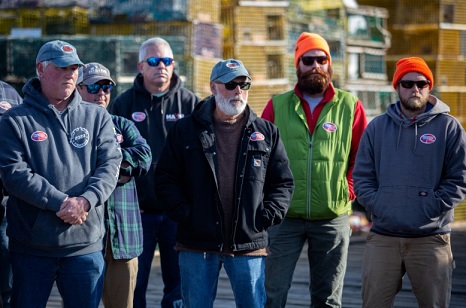
Maine lobstermen appeal to the public to fund legal fight against federal regulations
Without the financial means to fight both the government and environmental activists, lobstermen said their very existence is at stake. Lobstermen speaking at the press conference (today) said they feared the offshore regulations currently proposed would creep inshore, where most of them fish, eventually choking off their livelihoods. They also stressed how much money their industry brings into the state and how it supports communities beyond fishermen. According to the Maine Department of Marine Resources, Maine’s 2020 lobster catch was worth $406 million. That was down from $491 million in 2019. “That’s why we need everyone to step up and help us save the fishery,” photos, >click to read< 17:59
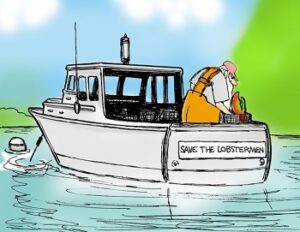
Opinion: Federal rules are sinking Maine’s lobster industry
As a lifelong Maine lobsterman, I understand the inherent dangers of my job. I keep watch on the forecast knowing that sudden weather changes can make the difference between a successful day at work and putting my crew’s life at risk. These days, however, the hazard posed by Mother Nature does not compare with the perfect storm of regulations coming out of Washington that threaten my job, our way of life and may eventually sink a fishery that has supported communities and generations of families here in Maine. By Kristan Porter >click to read< 15:18

Can American lobstermen survive new restrictions, ESA listing of the North Atlantic Right Whale?
For centuries, North Atlantic right whales were aggressively hunted for their meat and their oil, which was used to keep lamps lit and to make soap.,, Since 2017, the National Oceanic and Atmospheric Association (NOAA) has documented 34 dead whales (21 in Canada; 13 in the U.S.), and 16 whales with serious injuries from entanglements or vessel strikes. In an attempt to conserve and rebuild the population, NOAA announced new regulations in August 2021 on the Maine lobster and Jonah crab industries, including the closure of large parts of the Gulf of Maine to lobstering between October and January and requiring more traps per trawl to reduce the overall number of lines in the water. >click to read< By A.N. Smith 13:15
Electronic Monitoring: Who Gets to Use Our Oceans?
Much of the current effort to create coordinated planning for use of our oceans started in 2010, when President Obama issued an executive order that called for the development of “coastal and marine spatial plans.” The idea is to figure out where to put things like aquaculture and wind farms without harming other things such as fisheries. In early August, the ASMFC announced that it’s considering a plan to require electronic tracking devices on federally permitted vessels that operate in American lobster and Jonah crab fisheries. Most of the lobster fishermen to be impacted are in Maine, and while they’ve expected the tracking plan to go into motion for some time now, Porter says, “there will be some seriously pissed-off lobstermen when this actually hits the ground.” >click to read< 09:21

Lobster Fishing Association Files Lawsuit Against NOAA Whale Plan
A lobster fishing group based in Maine filed a lawsuit against the federal government on Monday charging new rules designed to protect whales are not based on the best available science. National Oceanic and Atmospheric Administration announced the rules, designed to protect North Atlantic right whales, in August.,, The Maine Lobstermen’s Association has pushed back against the rules,,, >click to read< 11:27

Rep. Sherm Hutchins – Maine’s lobster industry is under siege
Maine’s lobstermen and women are under attack by the Biden Administration after a recent set of rule changes restricting seasonal lobster fishing in 950 square miles of federal waters off Maine’s coast. This is an inflexible and poorly considered attempt to protect the North Atlantic right whale population. The series of rule changes are the most heavy-handed in a long line of attempts to undermine the lobster industry here in Maine. If our fisheries are not protected, and if these rules are not reversed, Maine’s fishermen and women will not recover. >click to read< 09:47
More siege from the non-productive slugs of the enviroscam movement – Zack Klyver, science director with the group Blue Planet Strategies, has a different view on the issue. I’m sympathetic to them and know that they work extremely hard,,, >click to read< 11:25

Lobster industry is anxious over upcoming North Atlantic right whale protection rules
The federal government is working on new rules designed to reduce risk to North Atlantic right whales,,, One of the threats the whales face is entanglement in ropes that connect to lobster and crab traps in the ocean. Early indications show that the changes required by the rules could be significant. They’re also vulnerable to ship strikes, and face the looming threat of warming oceans. Acting NOAA Fisheries Assistant Administrator Paul Doremus said in June that the U.S. and Canada, which also harvests lobsters, must “take and sustain additional efforts to reduce right whale mortalities and serious injuries.” >click to read< 10:39
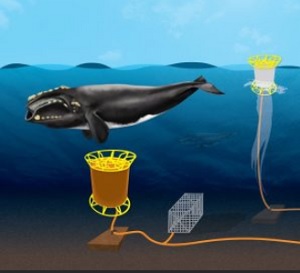
Fed Right whale plan could mean lobster industry changes – a reinvention of the fishery as we know it
Federal officials recently released plans,,, But it’s the risk reduction target, an aggressive 98 percent, that Maine Department of Marine Resources officials said means only one thing, “a complete reinvention of the fishery as we know it.” The conservation framework, an addition to the 582-page biological opinion, creates a four-phased approach to all but eliminate the death and serious injury of the whales in federally managed fishing grounds. The first phase calls for a 60 percent reduction in right whale deaths and serious injuries this year. Patrice McCarron, Maine Lobstermen’s Association, fears the industry can’t sustain that level of change. “If you look at the changes we’ve made over the last 25 years, there’s not a lot left to give,”, >click to read< 10:27

Biological Opinion to Protect Right Whales Met With Opposition on All Sides
The National Marine Fisheries Service (NMFS) released a key report called a Biological Opinion yesterday that calls for a 98 percent reduction in risk to North Atlantic right whales over the next 10 years. The goal is meant to be achieved over the course of four phases that correspond with increasingly tight restrictions on lobster and crab fisheries as well as other fixed-gear fisheries that use vertical buoy ropes. Vertical ropes attached to trap/pot gear is known to lethally entangle the whales. >click to read< 16:38

Well, hush my puppies! Georgia Con groups boycott New England Lobster Industry
Maine’s lobster industry is keeping a wary eye on a consumer boycott launched in the state of Georgia. Conservation groups there charge that New England’s lobster gear and trap-rope risk entangling and killing endangered right whales, and they say seafood lovers should choose other options. Alice Keyes, the coastal conservation director for an organization called 100 Miles, so-named for Georgia’s hundred-mile shoreline. The campaign is called “Eat Local, Not Lobster”. “I hope consumers are smarter than falling for these false campaigns,” says Patrice McCarron, the Maine Lobstermen’s Association executive director. >click to read< 09:25
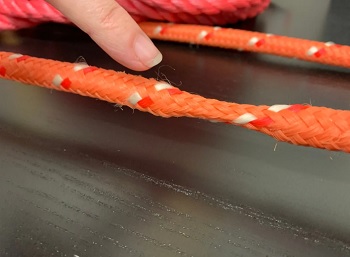
Lobstermen say proposed Right Whale rules are expensive, dangerous, and based on outdated data
During the final public hearings, Maine Department of Marine Resource Commissioner Patrick Keliher echoed a statement put out by Gov. Janet Mills earlier that week stating that “a one-size-fits-all approach in the state of Maine will not work.” Fishermen and environmentalists voiced concerns over the science federal regulators were using to make decisions, including the number of right whales alive today, how many have been harmed by entanglements or struck by ships and the effectiveness of proposed gear changes. “We all agree on one thing,” said Matt Gilley, a Harpswell lobsterman who spoke up at the virtual meeting. “That is that the data is flawed. In what direction, that remains to be seen.” >click to read< 11:10
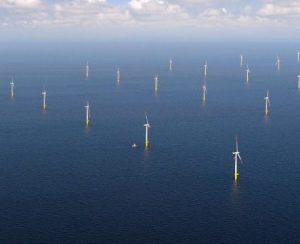
The Maine Fishing community weighs in on offshore wind development
Maine’s fishing community is deeply concerned that wind development will end our fishing heritage, which has sustained coastal communities for centuries and is integral part of Maine’s identity. Without dedicated research proving otherwise, we are skeptical that offshore wind can deliver on its promise of affordable clean energy as promised by global energy companies. “The state of Maine should be wary of trading its fishing heritage by entering a race to fulfill empty promises from international energy companies,” warned Executive Director Patrice McCarron of the Maine Lobstermen’s Association. Wise words from the Executive Director. >click to read< 11:30
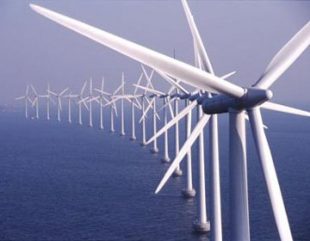
Offshore wind project raises questions for lobstermen
A Gulf of Maine offshore wind power initiative Maine Governor Janet Mills rolled out late last year has raised concern in the lobster fishing community,,, Mills has said the Governor’s Energy Office should “work closely with Maine’s commercial fishing industry,,, The Maine Lobstermen’s Association agrees collaboration is necessary. Maine is also taking part in a federally led task force on offshore wind with New Hampshire and Massachusetts. Named the Gulf of Maine Intergovernmental Regional, >click to read< 19:45
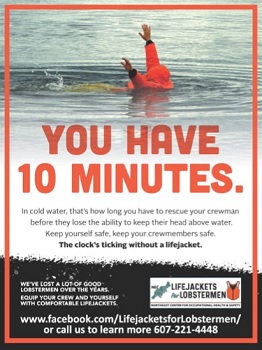
Lifejackets for Lobstermen Project works to get PFDs on every fisherman
From 2000-2016, the Centers for Disease Control charted 204 commercial fishing fatalities from falls overboard. None of the fishermen recovered were wearing a lifejacket, and 108 of the fishermen’s bodies were never found, according to a report of the Lifejacket Project, which was launched to identify solutions and increase fishermen’s interest in wearing lifejackets. In its recently published, 20-page summary report, the Northeast Center for Occupational Health and Safety in Agriculture, Forestry and Fishing chronicles stories from the Lifejackets for Lobstermen Project and provides examples of the fishing community’s interest and engagement with the project. >click to read< 05:46



































